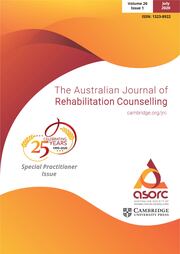Article contents
Psychometric Validation of the Taiwanese Version of the Job Satisfaction of Persons with Disabilities Scale in a Sample of Individuals with Poliomyelitis
Published online by Cambridge University Press: 13 April 2016
Abstract
Objective: To evaluate the measurement structure of the Taiwanese Version of the Job Satisfaction of Persons with Disabilities Scale (JSPDS). Design: A quantitative descriptive research design using exploratory factor analysis (EFA). Participants: One hundred and thirty-two gainfully employed individuals from Taiwan with poliomyelitis participated in this study. Results: EFA result indicated a three-factor structure accounting for 54.1 per cent of the total variance. The internal consistency reliability coefficients for the integrated work environment, job quality, and alienation factors were 0.91, 0.77, and 0.59, respectively. Only the integrated work environment and job quality factors showed positive correlations with life satisfaction. People with higher educational attainment also reported higher levels of job satisfaction than people with lower educational attainment. Conclusion: The three-factor measurement structure of the JSPDS appears to be parsimonious, psychologically meaningful, and interpretable, and can be used to improve the comprehensiveness of vocational rehabilitation outcome evaluation.
- Type
- Articles
- Information
- The Australian Journal of Rehabilitation Counselling , Volume 22 , Issue 1 , July 2016 , pp. 27 - 39
- Copyright
- Copyright © The Author(s) 2016
References
- 4
- Cited by



